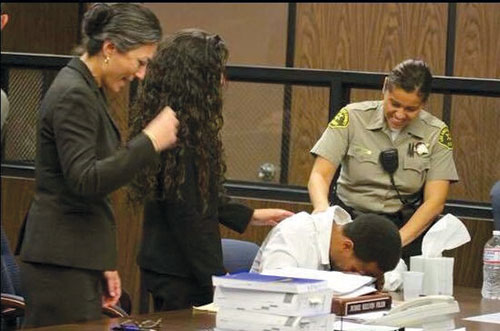
Three bills, sponsored and supported by NCIP (Northern California Innocence Project), were signed into California law on September 28, 2016, by Governor Brown.
The three bills–Senate State Bill 1134, Senate State Bill 1389, and Assembly Bill 813–will expand opportunities for wrongfully convicted individuals to prove their innocence and will help prevent wrongful convictions caused by false confessions.
In 2001, NCIP, a non-profit clinical program of Santa Clara University School of Law, began working with wrongfully convicted individuals to help them prove their innocence and started crafting legislation that would make claims of innocence easier to prove.
The signing of these three bills is a game-changer for NCIP and the individuals they represent.
The first bill, Senate State Bill 1134, makes more possible a successful claim of actual innocence, using newly discovered evidence.
Lucy Salcido Carter, the Policy Director at NCIP, says, “This law is important because it creates a new evidence standard in California that is actually doable. The old standard is almost impossible to meet.” Lucy Salcido Carter explains that similar standards have already been established in 43 other states.
Lucy Salcido Carter and colleagues at partner organizations worked with Democratic Senator Mark Leno and Republican Senator Joel Anderson, who jointly authored the bill that was unanimously approved in both the Senate and the Assembly.
The change in language from “points unerringly to innocence” of the old case law to “more likely than not” of the new penal code will increase the likelihood that wrongfully convicted individuals will be exonerated.
The second bill, Senate Bill 1389, requires that all murder interrogations be electronically recorded. Before this bill was signed into law, law enforcement was only required to record interrogations of juvenile murder suspects.
Lucy Salcido Carter explains, “This bill helps prevent wrongful convictions by reducing the likelihood of false confession, a common cause of wrongful conviction.”
Salcido Carter describes the wrongful conviction of a man in Washington State who falsely confessed. She says, “He didn’t understand the consequences of confessing to a crime he didn’t commit. After nine hours of interrogation, he was exhausted and confessed because he thought that once he got out of the interrogation room he could better prove his innocence. Instead, he spent almost 10 years in prison for a crime he didn’t commit.”
The bi-partisan bill, jointly authored by Democratic Senators Steve Glazer and Ed Hernandez, facilitates the use, by people who have falsely confessed, of electronic recordings to show the circumstances in which the false confession occurred. Police can also use electronic recordings of homicide interrogations to show a true confession and to document other evidence they can use in trial.
The third bill, Assembly Bill 813, enables people who are no longer incarcerated to challenge their wrongful convictions through claims of actual innocence or claims that a prejudicial error occurred leading to adverse immigration consequences.
The bill creates an explicit right for a person no longer imprisoned to prosecute a motion to vacate a conviction or sentence based on a prejudicial error damaging the party’s ability to understand, defend against, or knowingly accept the adverse immigration consequences of a plea of guilty or nolo contendere, or based on newly discovered evidence of actual innocence.
Salcido Carter says, “Now innocent people who were wrongfully convicted but are no longer in custody can clear their records.”
Salcido Carter says, “These three bills help prevent wrongful convictions and provide better opportunities for wrongfully convicted individuals to prove their innocence, either while they are still incarcerated or after they are released.”
She adds, “We are thrilled these bills were signed into law and grateful to the bill authors and the governor for making it all happen.”
The three bills are not the endgame for NCIP.
Salcido Carter continues, “We will keep sponsoring laws that improve procedures for exonerating innocent people and that address the causes of wrongful conviction. A leading cause of wrongful conviction is eyewitness error. We have solid research that supports line-up and photo identification procedures that reduce the chance of eyewitness error. We would like all law enforcement agencies to use blind administration of photo identification and in-person line-ups, for example.” Blind administration means that the person administering the line-up or photo array does not know who the key suspect is and so cannot influence the eyewitness.
NCIP is currently determining which bills the organization and its coalition partners will sponsor in 2017.
New laws like these three innocence bills signed by Governor Brown help build a fairer criminal justice system.





